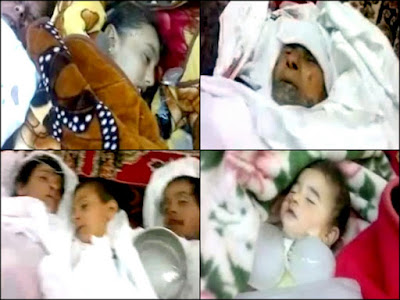 |
| QUBAIR VICTIMS: Children, a baby (right) and a grandmother (top right) |
 |
| Scores of video clips of the Qubair massacre are already posted on Youtube |
After troubleshooter Kofi Annan’s entry to the Syria
scene came the massacres -- first in Houla
and now in the Hama countryside.
By tonight, Annan will be pulling a rabbit out of his
hat. He will tell the 15 members of the UN Security Council of his “Plan B” and
then wait for the count of takers.
The death count in yesterday’s Hama countryside
massacre is provisionally put at 86, many of them women and children.
Government-backed shabiha
militiamen stabbed and shot their victims in the villages of Mazraat al-Qubair
and Maarzaf, about 20 kilometers northwest of the city of Hama.
"They executed
[nearly] every person in the village. Very few numbers could flee. The majority
were slaughtered with knives and in a horrible and ugly way," one activist
in Hama told the BBC's World Tonight.
"The small number
of villagers who fled were the only people remaining who could tell the world about
this horrible massacre."
A Qubair resident told
the BBC when the army and militia left the village, he discovered about 40
bodies -- mostly women and children who had been stabbed to death. He said he
saw the burned corpse of a three-month-old baby.
Activists, including
the Observatory based in Britain, called for an immediate investigation.
"The Syrian Observatory for Human rights calls on the international
monitors to go immediately to the area. They should not wait to tomorrow to
investigate this new massacre," it said in a statement.
"They should not
give the excuse that their mission is only to observe the ceasefire, because
many massacres have been committed during their presence in Syria."
In a statement on state
TV quoted by AFP news agency, the government said "a terrorist group”
committed the “heinous crime".
The Local Coordination
Committees, an activist network, said the Qubair killings took the total number
of people killed nationwide by security forces on Wednesday to 140.
Annan, the joint UN-Arab
League envoy, will give his latest assessment of the Syrian crisis at an open
meeting of the UN General Assembly on Thursday morning (New York time) and then
brief the Security Council behind closed doors later in the afternoon.
UN diplomats expect
Annan to present Security Council members with a new proposal to rescue his
failing peace plan -- a "contact group" of world and regional powers to
help end the violence. The group would bring together Russia, China, the United
States, Britain, France and key regional players, such as Saudi Arabia, Qatar,
Turkey and Iran.
If this is what Annan
plans to suggest, he's already been met with objections from the U.S. and Britain,
who don't want Iran to participate.
Leading political analyst Abdelwahhab Badrakhan,
writing today for the pan-Arab daily al-Hayat,
says what comes next after the collapse of Annan’s six-point plan “is unclear –
except that the gradual trend for outside intervention is already on the table.
“But such intervention, if
it were to happen, won’t restore the regime’s lost national and pan-Arab
virginity. The regime proved so brutal and oppressive and committed so many
crimes as to make its forcible ouster a humanitarian duty.
“Obviously, invoking
Chapter VII of the UN Charter, as the Arab League wants, won’t be easy. It
would mean eventual recourse to military action, which is anathema to Russia
and Iran. They are the two countries intruding the most to buttress the regime.
But both know the regime can’t survive -- hence their concern.
“The Russians and Iranians
want to secure their postmortem interests. And the only way they can do so is
to have a hand in configuring the next regime’s shape.”
Badrakhan says time is
short for the “grand bargain” that would put all the principal bilateral
differences between Washington and Tehran – including Syria -- on the table at
the same time and agree to resolve them as a package.
True,
he says, the idea of a palace coup in Syria (that would overthrow President
Bashar al-Assad by his inner circle) has become redundant. But it always
remained the inevitable synonym of “real reform.” To preempt the growing threat
of outside intervention lacking a UN mandate, Russia and Iran have no viable
option to safeguard their national interests other than engineer a palace coup in
Damascus.
